From 'New Hope' to New Dynasty, Jokowi's bid to shape Indonesia now moves behind the scenes
analysis
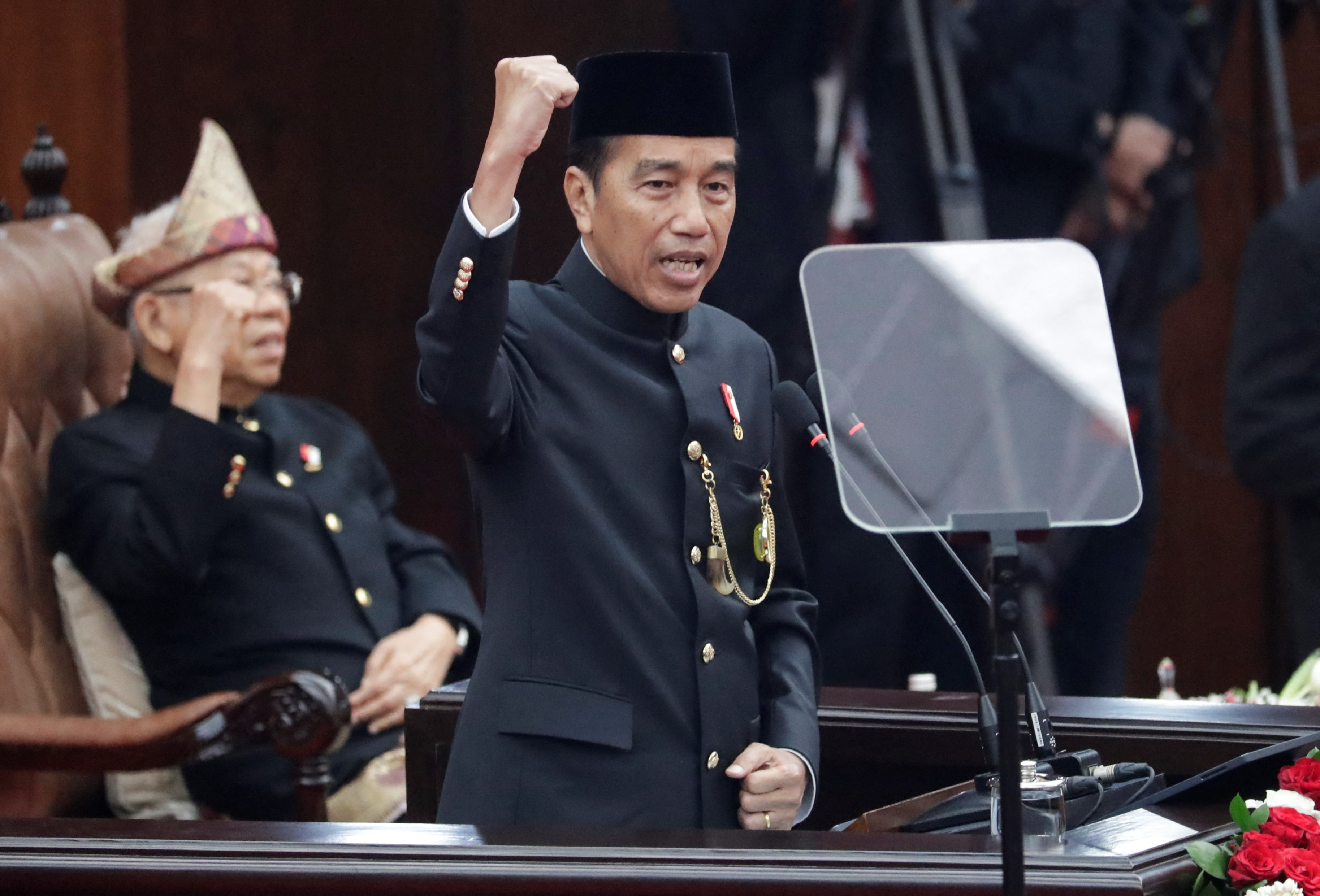
Joko Widodo is leaving the presidency but his connections to Indonesian politics run deep.
A 75 per cent approval rating is unimaginable to incumbent leaders in most other democracies around the world.
But the figure that Indonesian President Joko "Jokowi" Widodo leaves office with after a decade running the world's fourth largest country speaks to the extraordinary influence he will maintain after he's gone.
Hailed on the cover of Time Magazine as a "new hope" for democracy after his 2014 landslide election win, Jokowi's term in office has been characterised by big building projects and solid economic growth.
But also by the gradual hollowing out of democratic institutions.
He's weakened an anti-corruption body that's supposed to take down crooked politicians and engineered his oldest son to become the country's next vice-president.
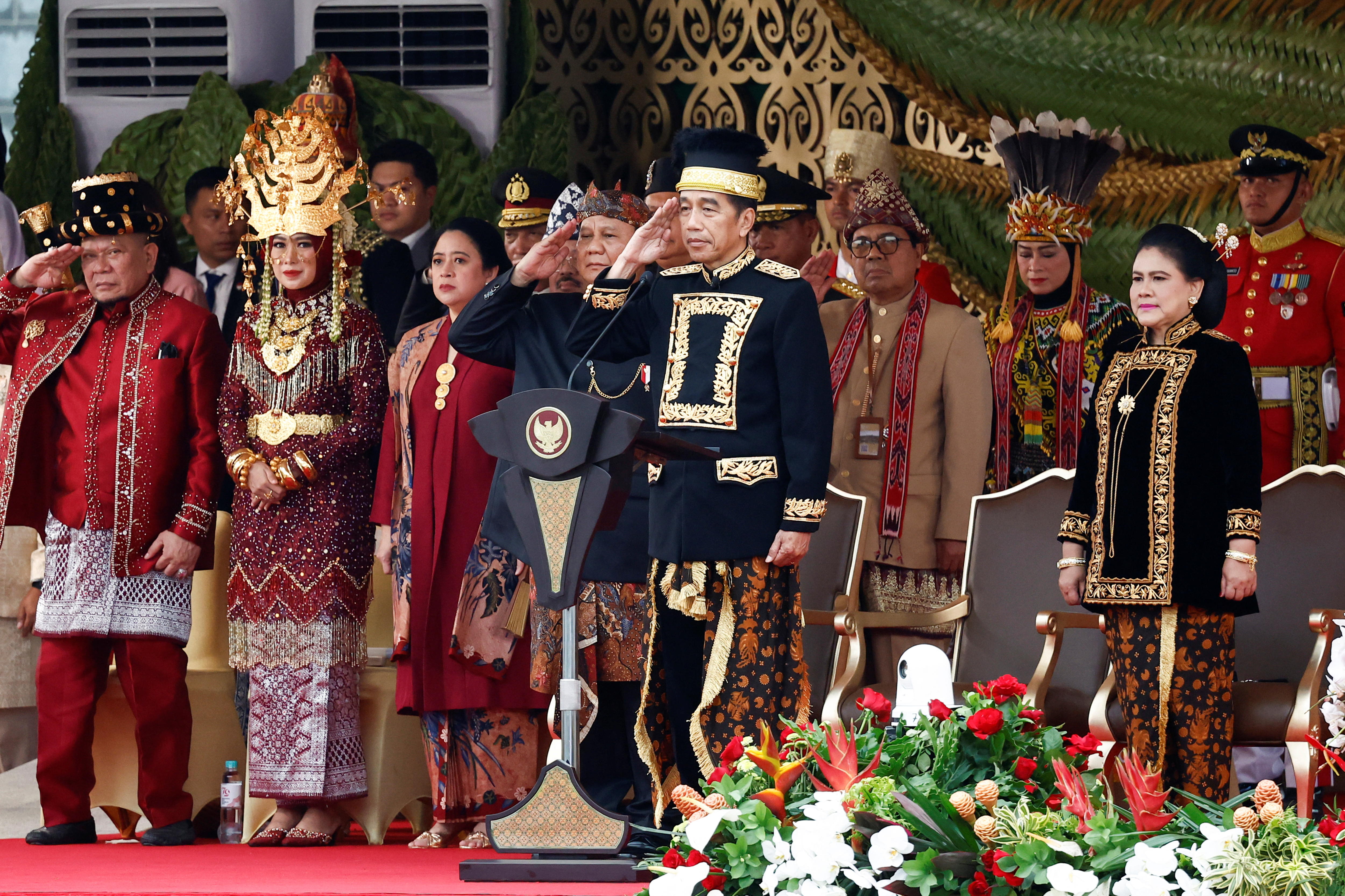
President-elect Prabowo Subianto (centre left) will succeed Joko Widodo (centre).
In approving an updated criminal code which takes effect in 2026, he restored jail penalties for people who personally insult the nation's leaders and criminalised sex outside of marriage.
While only close family members can report offenders of the latter to police, the rule is nonetheless seen as so draconian that authorities in tourist hotspot Bali moved to assure visitors it won't be enforced.
From salesman to kingmaker
Critics of Jokowi, as he's widely known, passionately decry him as a mild-mannered schemer manoeuvring to set up a new political dynasty.
His 37-year-old son Gibran Rakabuming Raka will take office as Indonesia's second top leader this weekend. Before that he was mayor of Surakarta.
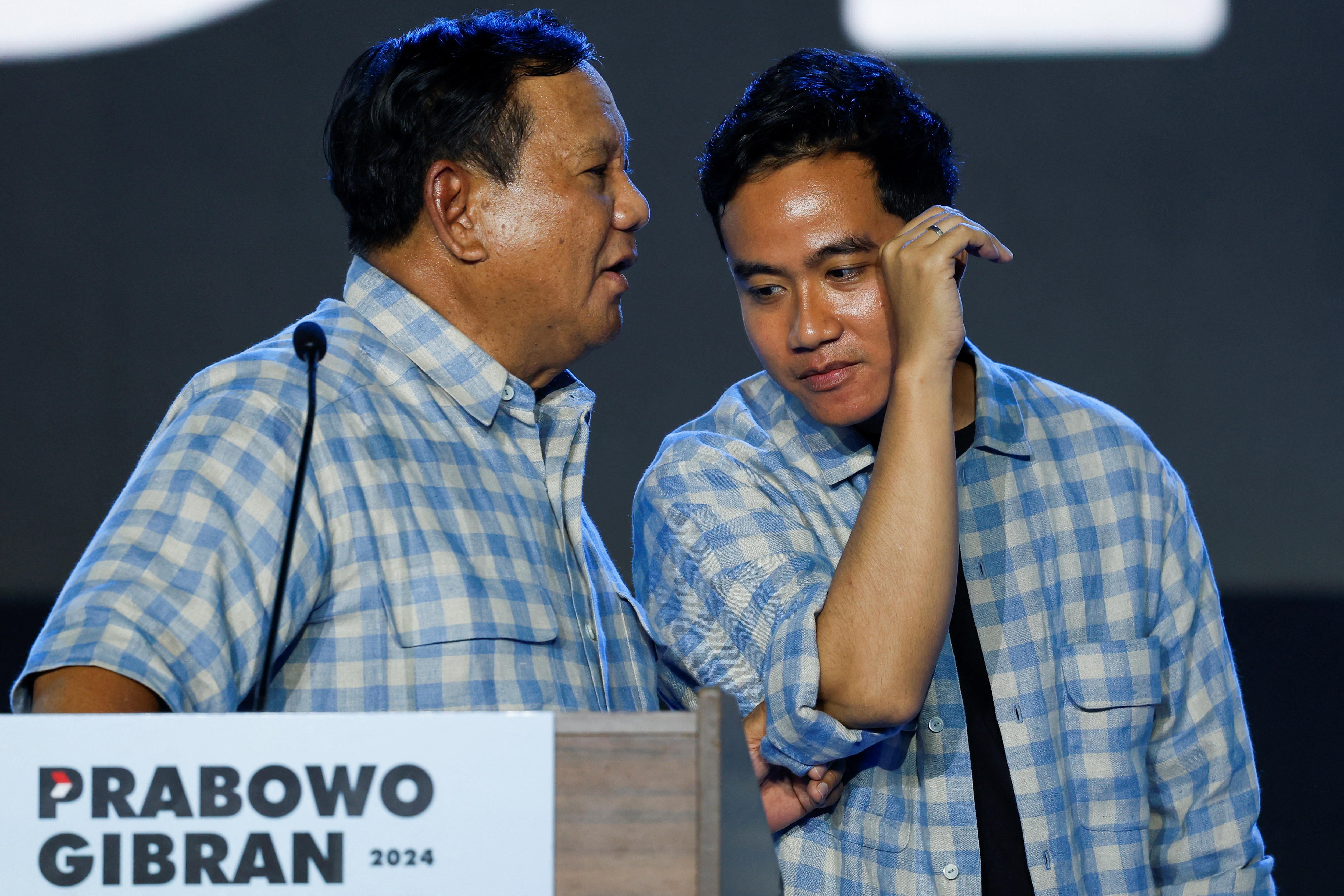
Prabowo Subianto (left) chose Widodo's son Gibran Rakabuming Raka as his VP.
Widodo's other son Kaesang Pangarep now chairs a small political party that's part of a broader coalition supportive of Widodo.
The outgoing president's son-in-law is the mayor of the city of Medan.
Widodo's brother-in-law sits on one of Indonesia's top courts, and last year cast the deciding vote to approve a loophole that allowed his nephew Gibran to run for the VP job, despite a minimum age requirement of 40.
Once seen as a humble furniture salesman from the central Java city of Solo taking on the entrenched family dynastic elites of Indonesian politics, Widodo is now firmly a kingmaker himself.
He didn't change the system so much as the system appeared to change him.
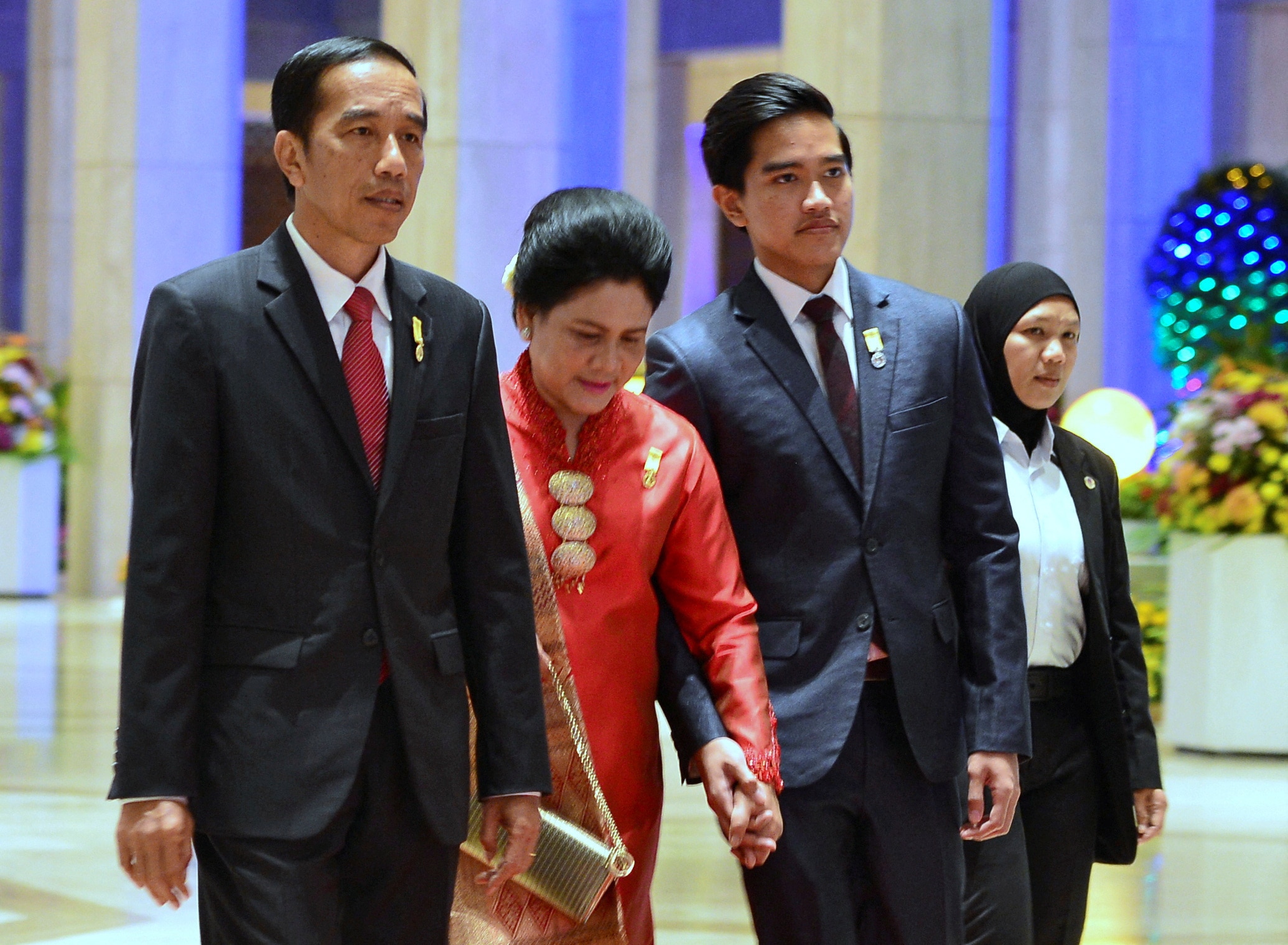
Joko Widodo's son Kaesang Pangarep (right) is a part of the new political dynasty.
Propelled to national office with the resources and backing of kingmaker and former president Megawati Sukarnoputri, Jokowi has skilfully outfoxed the political matriarch.
Her habit of humiliating the sitting president at gatherings of her powerful political party PDI-P by not allowing him to speak on stage while she gave lengthy orations, was often remarked upon over the years in Indonesia's media.
As chair of the party started by her father, Indonesia's first post-colonial leader Sukarno, she made it clear she called the shots, and the president popularly elected by the masses was in the palace to carry out her party's agenda.
But in the end Jokowi ditched Megawati's party, backed his former election rival Prabowo Subianto and now has a family member one step away from the top job in the next administration, leaving Sukarnoputri firmly in opposition.
'New Hopeless' of Indonesia
His critics though aren't cheering on his mastery of elite political games.
They deride it as nepotism, and also slam his key legacy project — a $45 billion new capital city in the jungles of Borneo, as an extravagant vanity project that the nation can't afford.
Plagued by delays and a reluctance of foreign investors to provide much needed funding, the new capital project is legally locked in for Widodo's predecessors to continue building by a law passed by his allies.
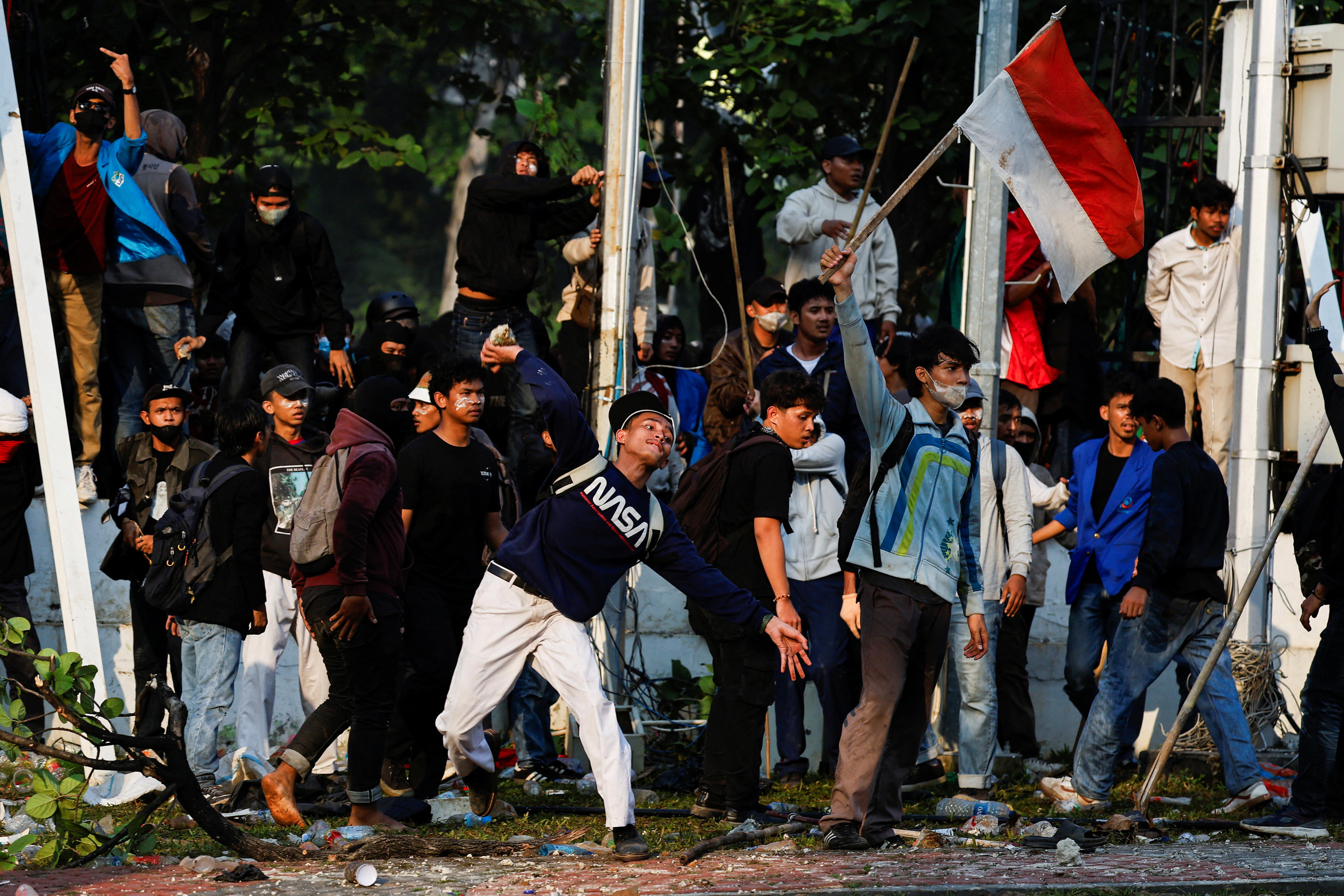
Demonstrators clashed with riot police during the protest outside the Indonesian Parliament building in August.
Even in his final months, protests erupted in cities across the nation against efforts by Widodo's parliamentary supporters to change election laws to potentially favour the president's younger son.
"In 2014 we believed in Joko Widodo to be the New Hope to reform Indonesia," said Feri Amsari, a political analyst at Andalas University.
"It turns out that he became the 'New Hopeless' for this nation."
But views like this, however strongly held by a section of Indonesia's educated urbanites, are not widespread.
Most popular exiting president
As the approval rating pollster Indikator Politik Indonesia has continually shown throughout Widodo's time in power, he remains an incredibly popular figure, with a rating far higher than any previous Indonesian president in their final months.
"The public satisfaction level of Joko Widodo is high … because he successfully maintained a low inflation rate, especially in his second term," said Dr Burhanuddin Muhtadi, a political analyst and pollster with Indikator.
"The perspective very much depends on the management of inflation. If households are happy, people are happy, it's as simple as that," he said at the launch of the latest poll this month.
Widodo's focus on building highways, toll roads, courting Chinese investment for the booming nickel sector and building South-East Asia's first high speed rail are also cited as part of his appeal.
Other surveys have found general public perceptions that Indonesia has become more corrupt in the past decade, while the issues related to democracy backsliding are well discussed in the country's news media.
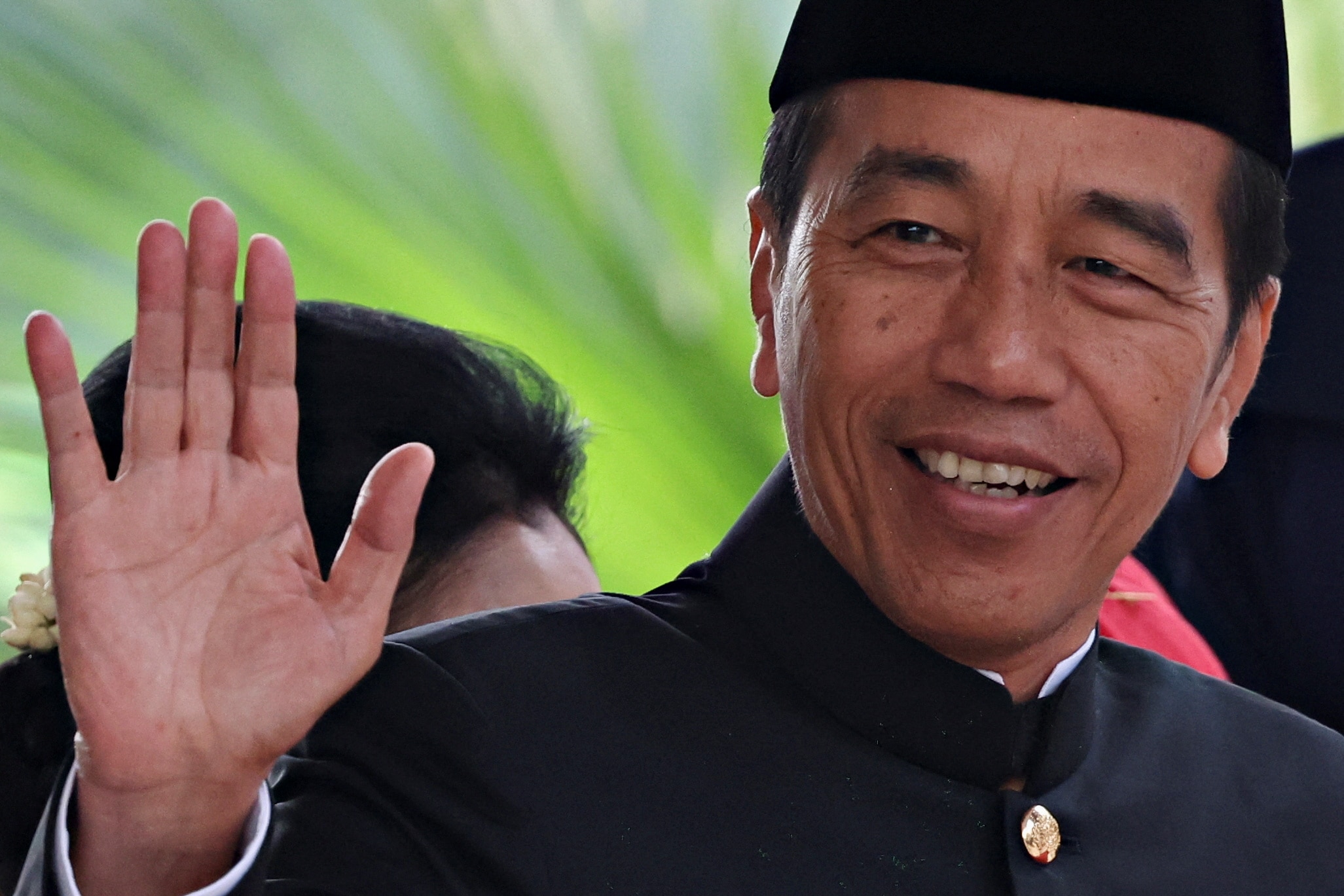
Joko Widodo leaves office as the most popular exiting president in Indonesia.
But it's a question of priorities.
"Respondents we surveyed criticise the decline of anti-corruption measures as well as the democracy issue, but overall people consider the economic factor is more important," said Dr Muhtadi.
In his final weeks in office, 63-year-old Widodo has been touring the country, spending time at his new capital construction site, and offering various apologies for mistakes and policies that didn't please people.
He's registered to change his home address from Jakarta back to the small city of Solo, pledging to become a private citizen again.
The humble farewell optics have reinforced his preferred image of an everyman retiring to the quiet life after trying his best to build up the nation.
But the reality is he'll now be the father of Indonesia's second most powerful man, who owes his success to his dad's popularity.
Widodo's successor Prabowo Subianto too owes much of his landslide election victory to having the popular president's son on his ticket, and by inference, Widodo's backing.
It's hard to believe a politician as ambitious and successful as Jokowi would pass on the chance to use his influence on them in the years ahead.
By:https://www.abc.net.au/news/2024-10-17/joko-widodo-bid-to-shape-indonesia-moves-behind-the-scenes/104477748(责任编辑:admin)
下一篇:Archdiocese of Los Angeles agrees to pay $US880 million to victims of clergy sexual abuse
 Socceroos rescue a point
Socceroos rescue a point  Wallabies thrash Wales 52
Wallabies thrash Wales 52 Jake Paul beats Mike Tyso
Jake Paul beats Mike Tyso Live updates: England vs
Live updates: England vs  US election 2024: Donald
US election 2024: Donald  US election live: Kamala
US election live: Kamala
- ·North Korea's latest weapon agains
- ·Hezbollah says Israel 'cannot impo
- ·Inside the rise of US oligarchs and how
- ·Thailand's worst suspected serial
- ·Tabi shoes are turning heads from Holly
- ·FBI arrests Florida man planning attack
- ·Illegal immigrant gets life sentence fo
- ·Bibles, water, watches and sneakers: Do
- ·North Korea's latest weapon against
- ·Hezbollah says Israel 'cannot impose
- ·Inside the rise of US oligarchs and how i
- ·Thailand's worst suspected serial ki
- ·Tabi shoes are turning heads from Hollywo
- ·FBI arrests Florida man planning attack o
- ·Illegal immigrant gets life sentence for
- ·Bibles, water, watches and sneakers: Dona
- ·US to give Kyiv anti-personnel landmines
- ·An arrest warrant for Benjamin Netanyahu
- ·One of Vietnam's high-profile politi
- ·Shanghai Walmart Attack: A Man Randomly S
- ·South Korean police officers jailed over
- ·Cambodia publicly shames maid deported af
- ·North Korea to use all forces including n
- ·Philippines condemns China attack of Viet
- ·US adds 2 more Chinese companies to Uyghu
- ·North Korean defector steals South Korean
- ·Malaysia deports Cambodian worker for cal
- ·Rebels battle for Myanmar junta’s weste

